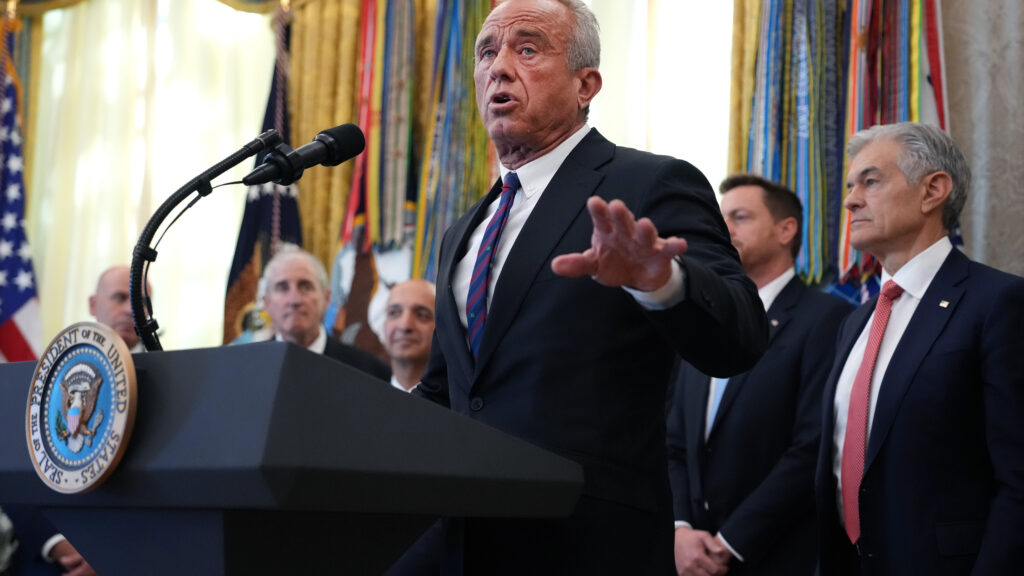Health
Kennedy Backs Trump’s Plan to Reduce Obesity Drug Prices

Health Secretary Robert F. Kennedy Jr. expressed unexpected support for the Trump administration’s initiative aimed at lowering prices for obesity medications during an event at the White House on March 14, 2024. This plan focuses on expanding access to popular weight loss drugs produced by Eli Lilly and Novo Nordisk, including for patients enrolled in Medicare and Medicaid.
Kennedy, known for his long-standing criticism of pharmaceutical companies, has previously voiced opposition to Medicare coverage for GLP-1 medications. His lifestyle-oriented campaign, dubbed “Make America Healthy Again,” has emphasized wellness strategies over pharmaceutical solutions. However, his tone shifted dramatically as he hailed the President’s deal, calling it “a momentous accomplishment.”
In remarks made alongside the CEOs of Lilly and Novo Nordisk, Kennedy described the initiative as “a tool in the toolkit,” underscoring its potential significance. He clarified, “It is not a silver bullet. It is an arrow in our quiver.” This statement reflects a nuanced view of pharmaceutical interventions in health care.
The new pricing strategy aims to make effective weight loss treatments more affordable, addressing a growing concern over obesity in the United States. According to the Centers for Disease Control and Prevention (CDC), the prevalence of obesity among adults was approximately 42.4% in 2020, highlighting the urgency of effective treatment options.
Kennedy’s endorsement marks a notable pivot in his approach to public health policy, especially considering his previous stance on pharmaceutical practices. This shift may indicate a broader acceptance of collaborative efforts between government and industry to tackle pressing health issues.
The involvement of major pharmaceutical companies in this initiative raises questions about the balance between public health objectives and corporate interests. While Kennedy has often criticized drug manufacturers for high prices and profit motives, his current support suggests a recognition of the potential benefits in addressing obesity.
As discussions continue, it remains to be seen how this plan will affect pricing in the long term and whether it will lead to increased accessibility for patients who need these vital medications.
The Trump administration’s focus on obesity drugs signals a changing landscape in public health strategy, where innovative partnerships may play a critical role in advancing health outcomes.
-

 Top Stories1 month ago
Top Stories1 month agoRachel Campos-Duffy Exits FOX Noticias; Andrea Linares Steps In
-

 Top Stories1 week ago
Top Stories1 week agoPiper Rockelle Shatters Record with $2.3M First Day on OnlyFans
-

 Top Stories6 days ago
Top Stories6 days agoMeta’s 2026 AI Policy Sparks Outrage Over Privacy Concerns
-

 Sports5 days ago
Sports5 days agoLeon Goretzka Considers Barcelona Move as Transfer Window Approaches
-

 Top Stories1 week ago
Top Stories1 week agoUrgent Update: Denver Fire Forces Mass Evacuations, 100+ Firefighters Battling Blaze
-

 Top Stories1 week ago
Top Stories1 week agoOnlyFans Creator Lily Phillips Reconnects with Faith in Rebaptism
-

 Top Stories5 days ago
Top Stories5 days agoWarnock Joins Buddhist Monks on Urgent 2,300-Mile Peace Walk
-

 Entertainment6 days ago
Entertainment6 days agoTom Brady Signals Disinterest in Alix Earle Over Privacy Concerns
-

 Top Stories7 days ago
Top Stories7 days agoOregon Pilot and Three Niece Die in Arizona Helicopter Crash
-

 Top Stories4 days ago
Top Stories4 days agoCBS Officially Renames Yellowstone Spin-off to Marshals
-

 Health2 months ago
Health2 months agoTerry Bradshaw Updates Fans on Health After Absence from FOX NFL Sunday
-

 Sports4 days ago
Sports4 days agoSouth Carolina Faces Arkansas in Key Women’s Basketball Clash




